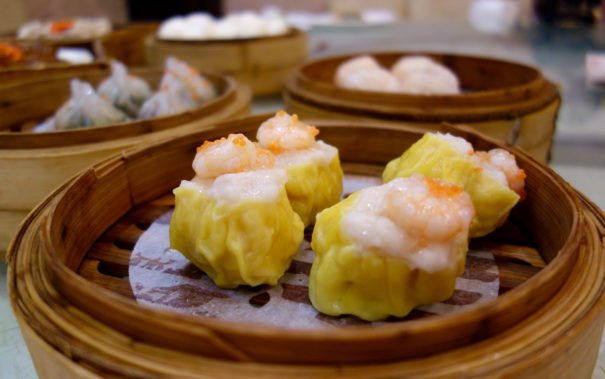
The Problem With Traveling Alone Is That You Can’t Possibly Eat Enough Dim Sum

The Problem With Traveling Alone Is That You Can’t Possibly Eat Enough Dim Sum
Dim Sum in Guangzhou
The problem with traveling alone in Guangzhou is that a single individual cannot possibly consume enough dim sum. A friend offered recommendations for dim sum restaurants in the city, but I was missing the most crucial ingredient: other people.
Uncle Johnny took one look at my recommendations and tossed them aside. “These are tourist places,” he said as we chatted late into the evening at a hostel downtown. I did not know whether Uncle Johnny, an acerbic 40-something man wearing bright yellow Crocs and a cargo khaki shoulder bag, had a real name: everyone knew him simply as Uncle Johnny. What I did know was that he and I needed to eat dim sum together. I made him an offer he couldn’t refuse: if he brought me to his favorite dim sum restaurant, I would foot the bill.
“Tell me exactly how much you want to spend,” he responded, “and I will order accordingly.”
Our team of four—Uncle Johnny, myself, and two young Chinese tourists from the hostel—entered the restaurant the next morning and immediately lowered the average age by a factor of two. Across our banquet-sized table, an elderly man with large glasses sat alone, playing with his phone and gorging on a pineapple bun the size of a deep-dish pizza. Other tables around us were filled with groups of retirees, chatting and drinking endless amounts of diluted pu’er tea. Dim sum restaurants in Guangzhou serve as de facto community centers, in which anyone can while away the mornings protected from the tropical heat outdoors.
I requested an approximate bill of 150 yuan, or just over USD$20. Uncle Johnny took charge, and the bamboo steamers appeared in bunches: shrimp dumplings, spring rolls with taro, spare ribs, turnip cakes, chicken feet, shao mai, and more. “If you ordered this at the restaurants on your list, you’d pay at least three times the price,” Uncle Johnny made sure to tell me as the empty steamers disappeared one by one.
Uncle Johnny rose from his chair without saying a word and waddled toward the cashier’s counter. It was obvious: he was going to try to pay the bill. I flew out of my chair to run after him. He opened a payments app on his phone; I grabbed him and yanked him backward. “What are you doing?” I yelled. He shrugged me off with a casual, “You’re the guest!”—in China, the guest should never pay. But a deal is a deal, and no upstanding American can simply renege on an agreement. I pulled out my wallet just as one of our other dining mates came over, realizing that he, too, should try to pay the bill in the name of Chinese hospitality.
The woman at the cash register stared blankly as the three of us physically jostled to give up our money. I pushed Uncle Johnny aside, ignored the half-hearted efforts of our other friend, and handed over cash to complete the payment just ahead of their outstretched arms. Uncle Johnny walked away, shaking his head, while I waited for change.
The final bill was 150 yuan, just as Uncle Johnny had promised. I could leave Guangzhou satisfied: we had both held up our end of the bargain.